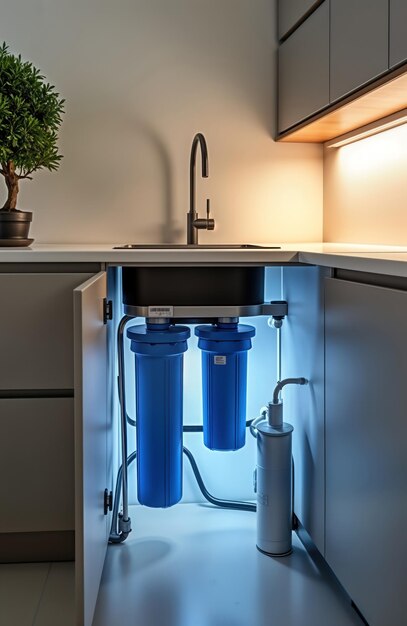Water is essential for life, and ensuring your household has access to clean, safe water should be a priority. Whether you are looking to improve your city water supply or filter well water, choosing the best whole house water filter can significantly enhance your home’s water quality. This guide offers practical tips and helpful advice on selecting the best system for your needs.
What Is a Whole House Water Filter and Why Do You Need One?
A whole house water filter is a filtration system that treats all the water entering your home. Unlike point-of-use filters that target individual taps, a whole house water filter ensures that every faucet, shower, and appliance receives filtered water. This system is ideal for removing contaminants like chlorine, lead, sediment, and other impurities that can affect your health, appliances, and overall comfort.
If you rely on well water, a whole house water filter becomes even more critical. Well water can carry bacteria, minerals, and other particles that are not always visible but can still affect your family’s health. The right filter system ensures that the water you consume, cook with, and bathe in is clean and safe.
Factors to Consider When Choosing the Best Whole House Water Filter
When shopping for the best whole house water filter, several factors come into play. Consider the following before making your purchase:
Water Source: The first thing you need to determine is whether you are using municipal (city) water or well water. Well water filters are designed to address different issues than city water filters. If you are using well water, the filter should be capable of removing biological contaminants, high mineral content, and other impurities unique to well water.
Filtration Needs: Do you need a filter for removing chlorine, heavy metals, or sediment? Understanding the specific contaminants in your water will help you narrow down the best whole house water filter options. Municipal water often contains chlorine, chloramine, and heavy metals, while well water may require additional filtration for bacteria, iron, and sulfur.
Flow Rate: The flow rate determines how much water the filter can process at once. A filter with a lower flow rate might be adequate for small households, while larger families may require a high-flow system to maintain water pressure.
Maintenance and Replacement: Like all filters, the components in a whole house system need regular maintenance and replacement. Some filters require more upkeep than others. Look for systems with easy-to-replace filters or those that offer low-maintenance options.
Filter Lifespan and Cost: Filters vary in price, and so do their lifespans. Some can last for years, while others need to be replaced more frequently. Be sure to consider the long-term cost of maintaining the filter system.
Best Whole House Water Filter Options for Well Water
Well water can come with specific challenges that municipal water doesn’t. If your home uses well water, it’s essential to choose a whole house filter that caters to your unique needs.
Sediment Filters: Sediment filters help remove larger particles like sand, dirt, and rust that often come with well water. They can be the first line of defense in a filtration system.
UV Water Purifiers: Well water is prone to contamination with bacteria, viruses, and other microorganisms. A UV water purifier uses ultraviolet light to kill harmful organisms, making it an excellent addition to any well water filtration system.
Iron and Sulfur Filters: Well water can sometimes contain excess iron, leading to staining and a metallic taste. Sulfur can cause a foul smell, often described as “rotten egg” odor. Specialized filters can address these issues, ensuring your water is safe and pleasant to use.
Reverse Osmosis Systems: For more thorough filtration, reverse osmosis (RO) systems can remove not only contaminants like heavy metals and chemicals but also minerals that may affect taste and odor. While RO systems are effective, they tend to have a slower flow rate and may require higher maintenance.
Where to Install the Best Whole House Water Filter
Placement is important when installing a whole house water filter. These systems are typically installed where the water line enters your home, allowing them to treat all incoming water. Be sure to check local codes or hire a professional to ensure the installation is correct and up to standard. For well water filtration, it’s often best to install additional equipment before the water enters your storage tank or pressure tank to address contaminants early in the process.
Signs That You Need a Whole House Water Filter
There are a few key signs that you should consider installing a whole house water filter, particularly if you have well water:
Cloudy or Discolored Water: If your water looks murky, has a tint, or stains your laundry, it’s a sign that you may need a filtration system to address sediment and other impurities.
Unpleasant Taste or Odor: Well water, in particular, can have a distinct, unpleasant taste or odor. A whole house water filter can help remove sulfur, chlorine, or other chemicals that affect water quality.
Clogged Plumbing and Appliances: Excessive minerals, sediment, or rust in the water can lead to clogged pipes, faucets, and appliances. Installing a filter will help reduce these issues.
Skin Irritation: Hard water or chlorine-heavy water can lead to dry, irritated skin. Filtering your water before it reaches your shower can prevent these issues.
Conclusion
Choosing the best whole house water filter is a key investment in your home’s health and comfort. By understanding your water source and identifying the specific contaminants you need to filter, you can choose the right system for your needs. Whether you are looking for a solution for well water or municipal water, a whole house filter ensures your family enjoys clean, safe water throughout the home. Regular maintenance and filter changes are essential to ensure long-term performance.
By selecting the best whole house water filter, you are making a proactive decision that will improve your water quality, protect your plumbing and appliances, and contribute to your overall well-being.
